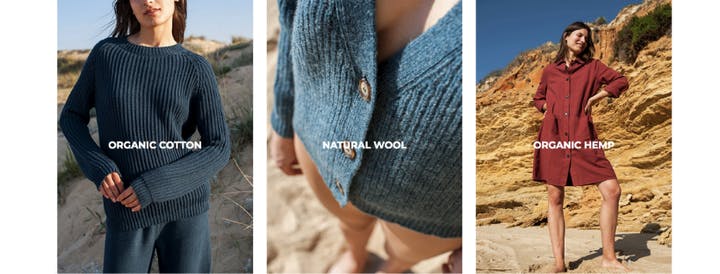L’Envers
Our Rating: 4 Stars - Good
Price: $ $ $ $
Country of origin: Spain
Official brand website: Visit

L’Envers is a brand that is making strides towards sustainability and environmental responsibility. With a “Planet” rating of “Great”, it is clear that the brand is taking steps to reduce its carbon emissions and minimize its impact on the planet. One of the key factors influencing its rating is its use of lower-impact materials, including organic cotton. By opting for materials that are better for the environment, L’Envers is showing a commitment to sustainability.
To further reduce waste, L’Envers limits its production runs. This means that they are not overproducing garments, which often leads to excess inventory and waste. By producing only what is necessary, L’Envers avoids contributing to the problem of textile waste that plagues the fashion industry. This is an important step in the right direction, as fashion is one of the most polluting industries in the world.
In addition to limiting waste, L’Envers also manufactures its products closer to home. By doing so, they are able to reduce the climate impact of long-distance shipping. Transporting goods across long distances contributes to carbon emissions and pollution. By producing their items closer to their intended market, L’Envers is actively working towards minimizing their environmental footprint.
Another positive aspect of the brand is its use of lower-impact dyes in all of its products. Traditional textile dyes often contain harmful chemicals that can pollute waterways and have negative health effects. By using dyes that have a lower impact on the environment, L’Envers is taking steps to ensure that their products are both beautiful and sustainable.
When it comes to packaging, L’Envers avoids the use of plastic. Plastic packaging is a major contributor to environmental pollution and waste. By opting for alternatives, such as paper or cardboard packaging, L’Envers is making a conscious effort to reduce plastic waste and promote a more sustainable approach to packaging.
In terms of workers’ rights, L’Envers has received a “It’s a Start” rating in our “People” category. This means that while they have taken some steps towards ensuring fair working conditions, there is still room for improvement. L’Envers carries out its final production stage in the European Union, which is considered a low/medium risk region for labor abuse. This is a positive aspect, as it shows that they are mindful of where their products are being made and the labor conditions in those regions.
L’Envers also traces all of its supply chain, which is crucial for ensuring transparency and accountability. By knowing where their materials come from and how they are produced, L’Envers can identify and address any potential issues regarding workers’ rights. However, there is no evidence that they have a Code of Conduct in place, which outlines the standards and expectations for their suppliers.
One area where L’Envers can improve is in ensuring that workers in their supply chain are paid living wages. This is an important aspect of workers’ rights, as many garment workers around the world are paid exploitative wages that are not enough to support themselves and their families. By taking steps to ensure that workers are paid living wages, L’Envers can make a positive impact on the lives of the people who contribute to their products.
When it comes to animal welfare, L’Envers has received an “It’s a Start” rating in our “Animals” category. While they have made some efforts towards minimizing animal suffering, there is still room for improvement. L’Envers has published a general statement about minimizing animal suffering, but it does not have a formal animal welfare policy in place. A formal policy would outline clear guidelines and commitments regarding the treatment of animals in their supply chain.
It is worth noting that L’Envers appears to use exotic animal hair in some of its products. The use of exotic animal hair raises concerns about the welfare and conservation of these animals. While L’Envers may not use materials such as leather, down, fur, angora, or exotic animal skin, they could explore alternative materials that do not involve animal exploitation.
Overall, based on the publicly available information we have reviewed, we rate L’Envers “Good” in terms of its sustainability practices. The brand is taking steps towards reducing its environmental impact, using lower-impact materials, and avoiding plastic packaging. However, there is still room for improvement in terms of workers’ rights and animal welfare. By continuing to prioritize sustainability and making further improvements, L’Envers has the potential to become a leader in the fashion industry in terms of both style and sustainability.







